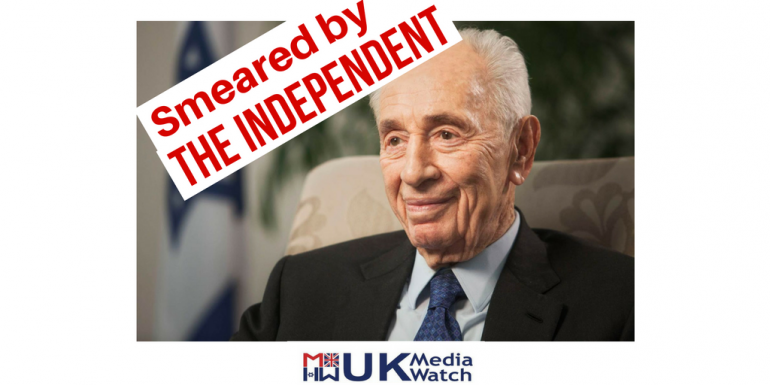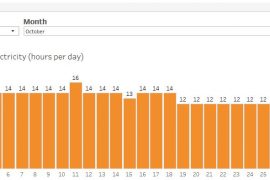Shimon Peres died yesterday at the age of 93. Within hours of his death, British media obituaries for the internationally popular Israeli statesman flooded the internet. Most have been positive, though some have included reasonable criticisms.
Whilst the usual propagandists from the ‘hate Israel’ brigade launched all too predictable attacks on Peres during the day, the Independent was the first ‘mainstream’ British news outlet to go all out smear.
Well, to be fair, it wasn’t just any Indy journalist.
It was Robert Fisk.
Fisk reduced the Israeli leader’s long and distinguished career to one incident carried out by the IDF during an operation against Hezbollah in 1996.
The headline of the Sept. 28th piece says it all.
 Don’t remember Peres, Fisk is saying, as the tenacious advocate for peace who held every major government position during his political career, nor as Nobel Peace Prize Winner for his efforts to reach an agreement with the Palestinians.
Don’t remember Peres, Fisk is saying, as the tenacious advocate for peace who held every major government position during his political career, nor as Nobel Peace Prize Winner for his efforts to reach an agreement with the Palestinians.
Rather, he suggests, thoughts of Peres should evoke memories of tortured humanity inflicted by Israel’s cruel machines of war – a legacy of “blood, fire and slaughter”.
The op-ed begins:
When the world heard that Shimon Peres had died, it shouted “Peacemaker!” But when I heard that Peres was dead, I thought of blood and fire and slaughter.
I saw the results: babies torn apart, shrieking refugees, smouldering bodies. It was a place called Qana and most of the 106 bodies – half of them children – now lie beneath the UN camp where they were torn to pieces by Israeli shells in 1996. I had been on a UN aid convoy just outside the south Lebanese village. Those shells swished right over our heads and into the refugees packed below us. It lasted for 17 minutes.
Shimon Peres, standing for election as Israel’s prime minister – a post he inherited when his predecessor Yitzhak Rabin was assassinated – decided to increase his military credentials before polling day by assaulting Lebanon. The joint Nobel Peace Prize holder used as an excuse the firing of Katyusha rockets over the Lebanese border by the Hezbollah. In fact, their rockets were retaliation for the killing of a small Lebanese boy by a booby-trap bomb they suspected had been left by an Israeli patrol. It mattered not.
A few days later, Israeli troops inside Lebanon came under attack close to Qana and retaliated by opening fire into the village. Their first shells hit a cemetery used by Hezbollah; the rest flew directly into the UN Fijian army camp where hundreds of civilians were sheltering. Peres announced that “we did not know that several hundred people were concentrated in that camp. It came to us as a bitter surprise.”
This was Peres’s contribution to Lebanese peace. He lost the election and probably never thought much more about Qana. But I never forgot it.
Fisk is referring to an incident during Operation Grapes of Wrath, a two-week military operation in Lebanon launched in April of 1996 to stop continuous Hezbollah rocket attacks on Israeli communities near the Lebanese border. Though rocket fire increased intensity since the beginning of 1996, the casus belli of the operation was one specific exchange which resulted in 38 Israeli casualties.
He uncritically parrots Hezbollah’s claim that the deadly attack on Israel in question was merely a retaliation for a “booby-trap” Israeli bomb that killed a small Lebanese boy, despite Israel’s denial and the fact that even UN investigation could not determine who planted the bomb.
Moreover, the claim by Fisk that Peres launched the “assault” to “increase his military credentials before polling day” is a version of a popular lie used continually by extremist anti-Israel activists: that Israeli leaders routinely launch military operations not to protect the country from its terrorist enemies, but to increase their popularity with an electorate putatively thirsting for the blood of innocents.

After several paragraphs in which Fisk describes in great detail the injuries and deaths caused by the Israeli shell, he pivots to the UN inquiry on the incident.
There was a UN enquiry which stated in its bland way that it did not believe the slaughter was an accident. The UN report was accused of being anti-Semitic.
Whilst we were unable to find any evidence that the UN report was accused of being compromised by antisemitism, as Fisk claims, the report’s conclusions were strongly criticized by the US as “inaccurate”. A US statement (from its U.N. mission) characterized the Israeli shelling as unintentional.
Further, Israeli claims that they “were responding to fire from Hezbollah fighters a few hundred yards from the [UN] base and hit the camp as a result of a series of…miscalculations” were backed up by the UN report’s admission that, before the Israeli shelling, “Hezbollah guerrillas fired rockets from…about 240 yards [away] from the U.N. compound” and that, at some point, Hezbollah fighters had entered the compound.
Additionally, if you read the conclusions of the UN inquiry, it’s more accurate to say that their report was “careful not to state explicitly that Israel had shelled the U.N. camp deliberately”.
Fisk’s theme of wanton Israeli slaughter of civilians takes an even more insidious turn in the next paragraph:
Peres called his Lebanese invasion “Operation Grapes of Wrath”, which – if it wasn’t inspired by John Steinbeck – must have come from the Book of Deuteronomy. “The sword without and terror within,” it says in Chapter 32, “shall destroy both the young man and the virgin, the suckling also with the man of grey hairs.” Could there be a better description of those 17 minutes at Qana?
“Grapes of Wrath” actually also has origins in the Book of Revelation in the New Testament (chapter 14 verses 19 and 20): “So the angel swung his sickle across the earth and gathered the grape harvest of the earth and threw it into the great winepress of the wrath of God”. But, more importantly, Fisk’s words evokes a version of ubiquitous antisemitic tropes suggesting that the Old Testament G-d is a G-d of vengeance against non-Jews, and that modern Jews (or Israelis) derive their ‘violent’ motivation from this ethos.
Fisk concludes thusly:
Yes, of course, Peres changed in later years. They claimed that Ariel Sharon – whose soldiers watched the massacre at Sabra and Chatila camps in 1982 by their Lebanese Christian allies – was also a “peacemaker” when he died. At least he didn’t receive the Nobel Prize.
Peres later became an advocate of a “two state solution”, even as the Jewish colonies on Palestinian land – which he once so fervently supported – continued to grow.
Now we must call him a “peacemaker”. And count, if you can, how often the word “peace” is used in the Peres obituaries over the next few days. Then count how many times the word Qana appear.
Beyond the distortions in his characterization of the 1996 war, Fisk’s effort to smear Peres based on one incident while he was prime minister – in the context of a 70 year career – is as absurd as assessing Barack Obama’s eight years as president by focusing entirely on a few US military attacks in Afghanistan, Pakistan or Syria which unintentionally killed innocent civilians.
Sadly, such a dishonest and vicious smear of Peres by Fisk, published on the very day we learned of his death, doesn’t at all come as a surprise to those of us familiar with the Independent, a news site which continues to earn its reputation as the most hostile ‘respectable’ anti-Israel voice in the UK.
Related articles
- Posts about The Independent (UK Media Watch)
- Posts about Robert Fisk (UK Media Watch)





